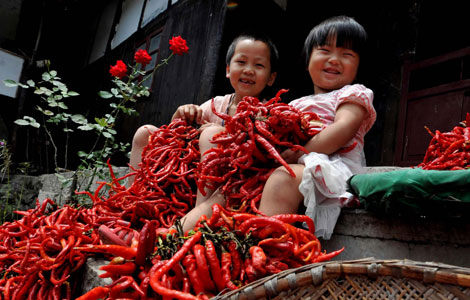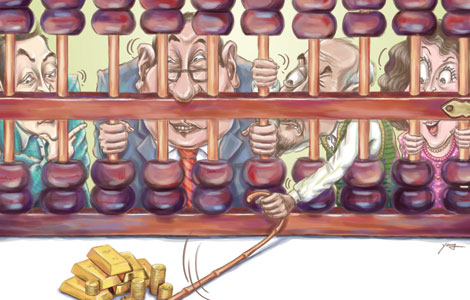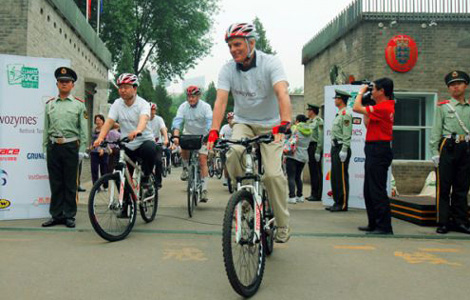Slower growth may hinder rural development
Updated: 2013-05-26 08:25
By Zhou Siyu (China Daily)
|
|||||||||||
China's decelerated economic growth, which is expected to become the new norm, might hamper its countryside's advancement, a top agricultural official said on Saturday.
"Annual economic growth rates of around 7 percent will bring some uncertainties in creating enough job opportunities for China's rural population," said Tang Renjian, deputy director of the Office of the Leading Group on Rural Work, Communist Party of China's primary rural management organ.
The central government's enhanced support for domestic enterprises and the service industry will provide some cushioning against job losses.
"But we don't know how long that can be sustained," Tang said.
The buoyant inflation rates of recent years have enticed the government to contain agricultural products' price growths, creating obstacles for farmers' income increases, he said.
Production will also face challenges from diminishing natural resources and agricultural reforms, Tang said.
"The government needs to devise a mechanism to protect farmers and encourage agricultural production," Tang said.
He made the remarks at a high-end forum organized by the Research Center for Rural Economy at the Ministry of Agriculture in Beijing.
The government has long stressed agriculture's importance and takes pride in the past nine years of increased grain outputs. The country produced 589 million metric tons of grain, official data showed in 2012.
Growing grain yields, however, did not rein in surging agricultural imports. In 2012, China's total grain imports hit a historical high of more than 70 million tons, renewing food security concerns, experts said.
"Increasing grain output cannot catch up to increasing consumption," said Yin Chengjie, head of the Chinese Association of Agricultural Economics, a government think tank.
"Now, we face a tight supply and some structural problems in the domestic food market."
Depletions of natural resources as agricultural inputs will also take a toll.
Sunny Verghese, CEO of Singapore-based grain trader Olam International Ltd, pointed to a recent Bloomberg report forecasting China will become a major importer of corn, wheat and rice by 2015 because of shrinking land and water resources.
The government should deepen rural reforms and expand support for farmers, forum participants said.
Han Jun, deputy chief of the State Council's Development Research Center, a top government think tank, said farmland should be a key reform issue.
"The government should let farmers have more property and economic rights over their land," Han said.
"We have an opportunity window over the next seven to eight years, and we must make full use of it."
Related Stories
Surplus workers in rural areas will be 'zero' this year 2013-05-20 07:40
More places at elite universities for rural students 2013-05-17 03:02
Starting with the urban-rural divide 2013-05-17 07:45
Guangzhou moves to abolish rural hukou 2013-05-10 01:57
Today's Top News
Japan urged to face history
Dialogue only solution to disputes
China to enhance AU partnership
Scrutiny urged to curb graft
Gutter oil to be used as auto fuel
Shanghai warns against telecom scams
Diaoyu Islands 'have never been Japan's territory'
China closes the gap with Switzerland, Europe
Hot Topics
Lunar probe , China growth forecasts, Emission rules get tougher, China seen through 'colored lens', International board,
Editor's Picks

|

|

|

|

|

|





